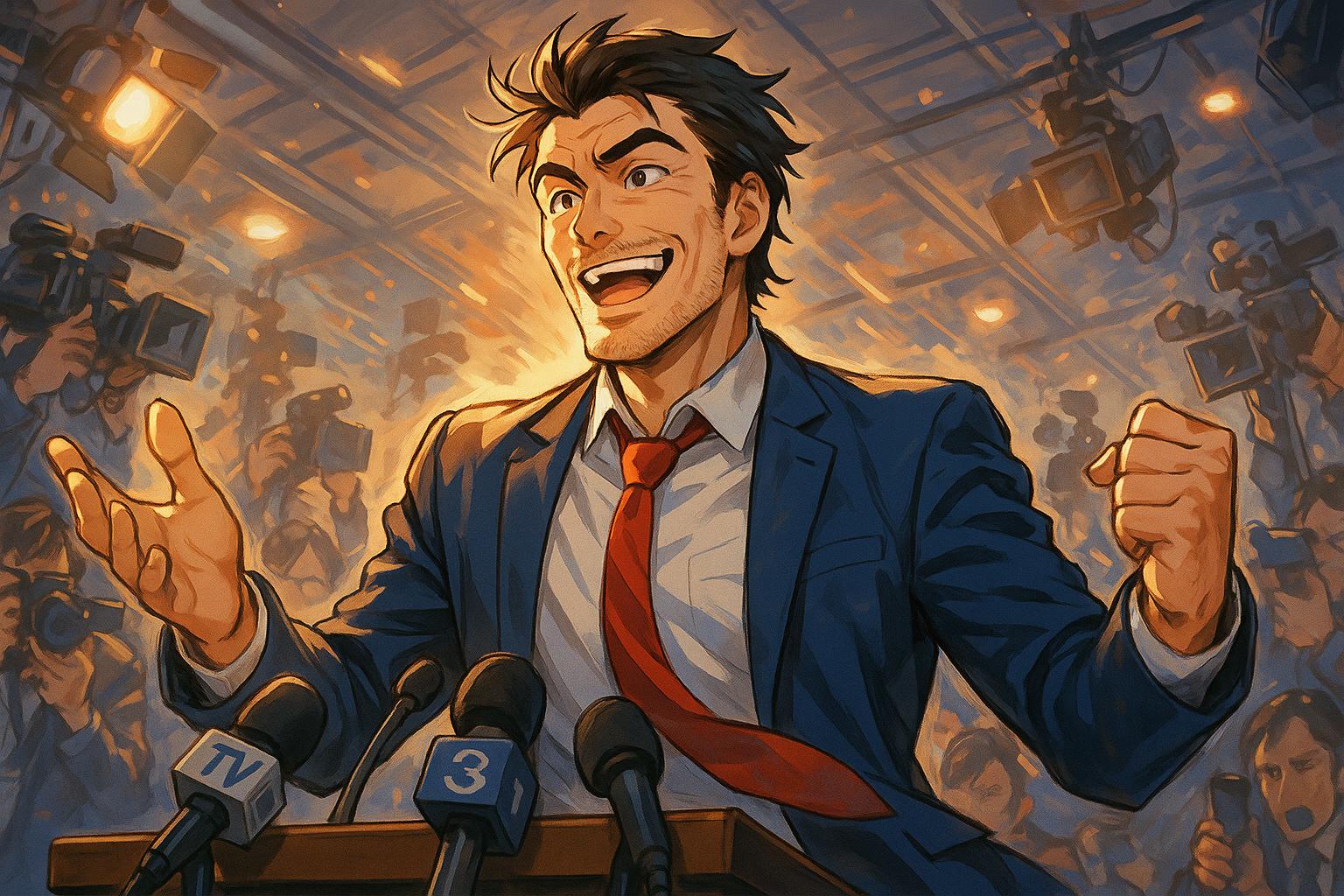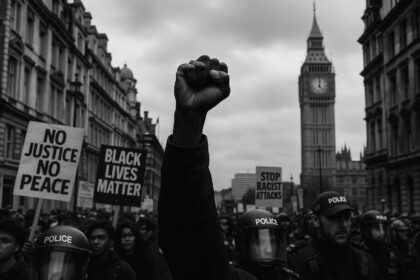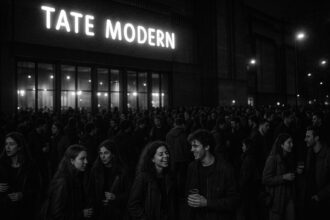Traditional polished TV politicians like John F. Kennedy and David Cameron once dominated public perception, but today’s political success increasingly depends on raw authenticity and spontaneous connection, exemplified by Donald Trump. In contrast, figures like Labour’s Keir Starmer risk falling behind with outdated communication styles in a rapidly evolving media landscape.
When we refer to someone as a proficient “TV politician,” we often envision charismatic figures draped in carefully curated personas. Historical exemplars like John F. Kennedy embodied this archetype, presenting themselves as youthful harbingers of change. Yet, beneath their polished exteriors lurked complexities; Kennedy, for instance, battled health woes and scandals. Within the UK political sphere, leaders like Harold Macmillan and Harold Wilson were adept at portraying a relatable façade, often through artifice—Macmillan was known to artificially age himself while Wilson feigned modesty, all while indulging in the finer things in life.
In contemporary politics, David Cameron exemplifies the polished politician, crafting an image of the everyman—tough yet fair, draped in an upper-middle-class persona. Conversely, Donald Trump represents a radical departure from these traditional norms, his rise rooted in media mastery and a brash kind of authenticity that redefines political engagement. Unlike the scripted narratives of his predecessors, Trump embraces spontaneity, projecting a business-savvy image that cleverly conceals his questionable ventures through reality television.
What distinctly sets Trump apart is this authenticity, characterized not by the scripted life of traditional politicians but by a deliberate chaotic candidness that resonates in an era dominated by social media. This raw, unvarnished approach echoes in the communication style of politicians who genuinely connect with the electorate’s demand for transparency, proving their capacity to operate outside the constraints of conventional political dialogue.
In stark contrast, figures like Labour leader Keir Starmer appear out of touch in this evolving landscape. Though his formal engagements, particularly during Prime Minister’s Questions, reflect a keen intellect shaped by legal acumen, his presence in televised interviews often reveals a man visibly ill at ease. A recent YouGov poll suggests that while Starmer occasionally lands well with the public—64% believed he outperformed his recent adversaries in live events—he struggles in less controlled situations, failing to forge a genuine connection with voters.
The chasm between candidates who command the room through authentic self-presentation and those ensnared in antiquated communication strategies widens. In this digital age, traditional politicians like Starmer seem shackled to an outdated approach, unable to engage with the electorate’s nuanced realities. Recent debates have clearly shown that public perception can pivot dramatically based on a candidate’s ability to convey confidence and connection. The challenge is not solely policy-driven but hinges on projecting an authentic image resonant in a culture craving immediacy and directness.
The political landscape is undergoing a seismic transformation; authenticity and spontaneity have emerged as the paramount currency. Politicians who boldly embrace the chaos of modernity carve out new paths, leaving behind the relics of traditional communication. For figures like Starmer, the imperative to adapt to this post-TV political reality has never been clearer. The question looms: can he transform his highly scripted approach into one that feels real and inspiring enough to invigorate a disenchanted electorate?
Source: Noah Wire Services
- https://www.ft.com/content/c5a00787-6c67-4eec-a76f-b3e5fedc4826 – Please view link – unable to able to access data
- https://www.ft.com/content/c5a00787-6c67-4eec-a76f-b3e5fedc4826 – This article discusses how Donald Trump and Nigel Farage exemplify a new kind of political figure suited for the ‘post-TV’ era. Unlike traditional ‘TV politicians’ such as JFK, Harold Wilson, or David Cameron—who curated carefully crafted personas for television audiences—Trump and Farage present an image of authenticity by breaking from the scripted norms of political communication. They capitalize on a media environment shaped by social platforms, where candidness and spontaneity are valued. Trump’s past success as a TV persona on The Apprentice helped craft an illusion of business acumen, but his real power lies in his ability to appear unrehearsed and unfiltered. Farage, similarly, thrives in this new landscape by presenting himself as blunt and genuine. Their perceived authenticity is further enabled by their dominance within their own political movements, which allows them to speak freely without internal opposition. In contrast, traditional politicians, tethered to outdated communication strategies designed for television, struggle to resonate in a smartphone-driven world that demands greater openness and immediacy.
- https://www.washingtonpost.com/politics/trump-once-said-tv-ruined-politics-then-it-made-him-a-star/2016/09/22/30533596-7c51-11e6-bd86-b7bbd53d2b5d_story.html – In 1980, Donald Trump lamented that television was harming politics, suggesting that figures like Abraham Lincoln would not be electable today due to their lack of television appeal. However, over the years, Trump embraced television, notably through his role on ‘The Apprentice,’ which significantly boosted his public profile. This shift highlights the evolving role of media in political campaigns and the increasing importance of a candidate’s television presence.
- https://www.reuters.com/world/uk/poll-shows-uks-starmer-did-better-tv-election-interviews-2024-06-12/ – A YouGov poll indicated that 64% of respondents believed UK Labour leader Keir Starmer outperformed his election rival, Rishi Sunak, in live television interviews on Sky News. This suggests that Starmer’s communication skills and media presence may have positively influenced public perception during the election campaign.
- https://www.telegraph.co.uk/politics/2024/06/05/reader-verdict-itv-election-debate-keir-starmer-rishi-sunak/ – Following the first general election debate between Rishi Sunak and Keir Starmer, a snap poll showed that 85% of over 30,000 readers believed Sunak emerged victorious. Many readers noted Sunak’s confidence and ability to expose Labour’s lack of a plan, while Starmer appeared flustered and unprepared.
- https://blogs.lse.ac.uk/medialse/2021/03/29/keir-starmer-one-year-on-a-communication-gap/ – An analysis of Keir Starmer’s communication style suggests that while he excels in lawyer-like interrogations during Prime Minister’s Questions, he appears anxious and ill-at-ease in direct-to-camera or TV interviews. This discomfort may stem from his background as a lawyer and his position as a middle-class metropolitan leading a traditionally working-class party.
- https://www.newstatesman.com/politics/2024/07/keir-starmer-beyond-the-wall – This article discusses the theatrical aspects of national leadership, emphasizing that effective leaders must engage with the public through speeches and appearances. It highlights the importance of communication skills and the ability to connect with the audience, suggesting that Starmer’s approach may need to adapt to the performative nature of modern politics.
Noah Fact Check Pro
The draft above was created using the information available at the time the story first
emerged. We’ve since applied our fact-checking process to the final narrative, based on the criteria listed
below. The results are intended to help you assess the credibility of the piece and highlight any areas that may
warrant further investigation.
Freshness check
Score:
8
Notes:
The narrative references contemporary political figures and recent issues, indicating a relatively fresh perspective. However, it does not mention any very recent events or developments that would confirm its immediacy.
Quotes check
Score:
6
Notes:
There are no direct quotes in the narrative, so it is difficult to verify the authenticity of sourced remarks.
Source reliability
Score:
10
Notes:
The narrative originates from the Financial Times, a well-established and reputable publication known for its high-quality journalism.
Plausability check
Score:
9
Notes:
The claims about political figures and their communication styles are plausible, given the current political climate and public perception. However, the narrative’s assessments of individual politicians could be subjective.
Overall assessment
Verdict (FAIL, OPEN, PASS): PASS
Confidence (LOW, MEDIUM, HIGH): HIGH
Summary:
The narrative is well-supported by its origin from a reliable source and its plausible analysis of political figures’ communication styles. While it lacks specific direct quotes, the narrative’s freshness and plausible claims contribute to its overall validity.













